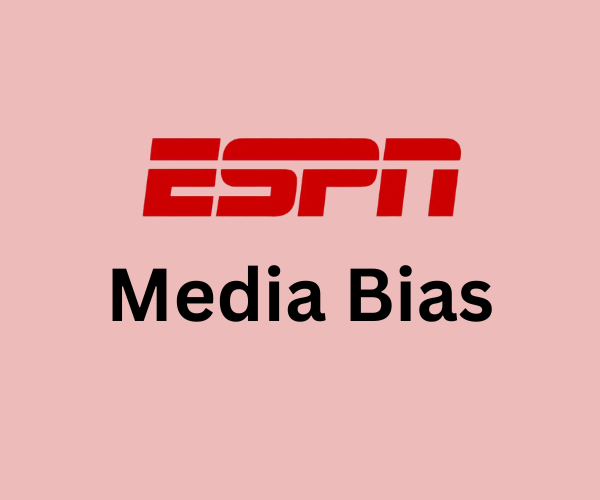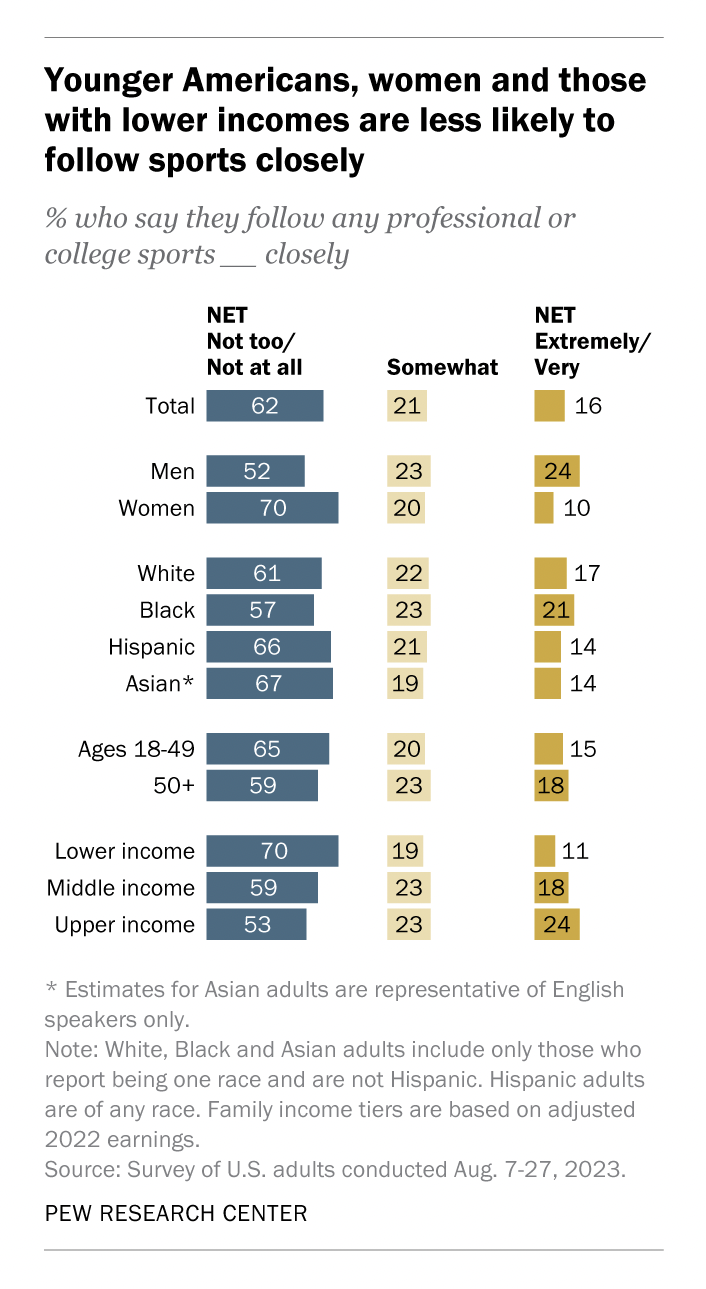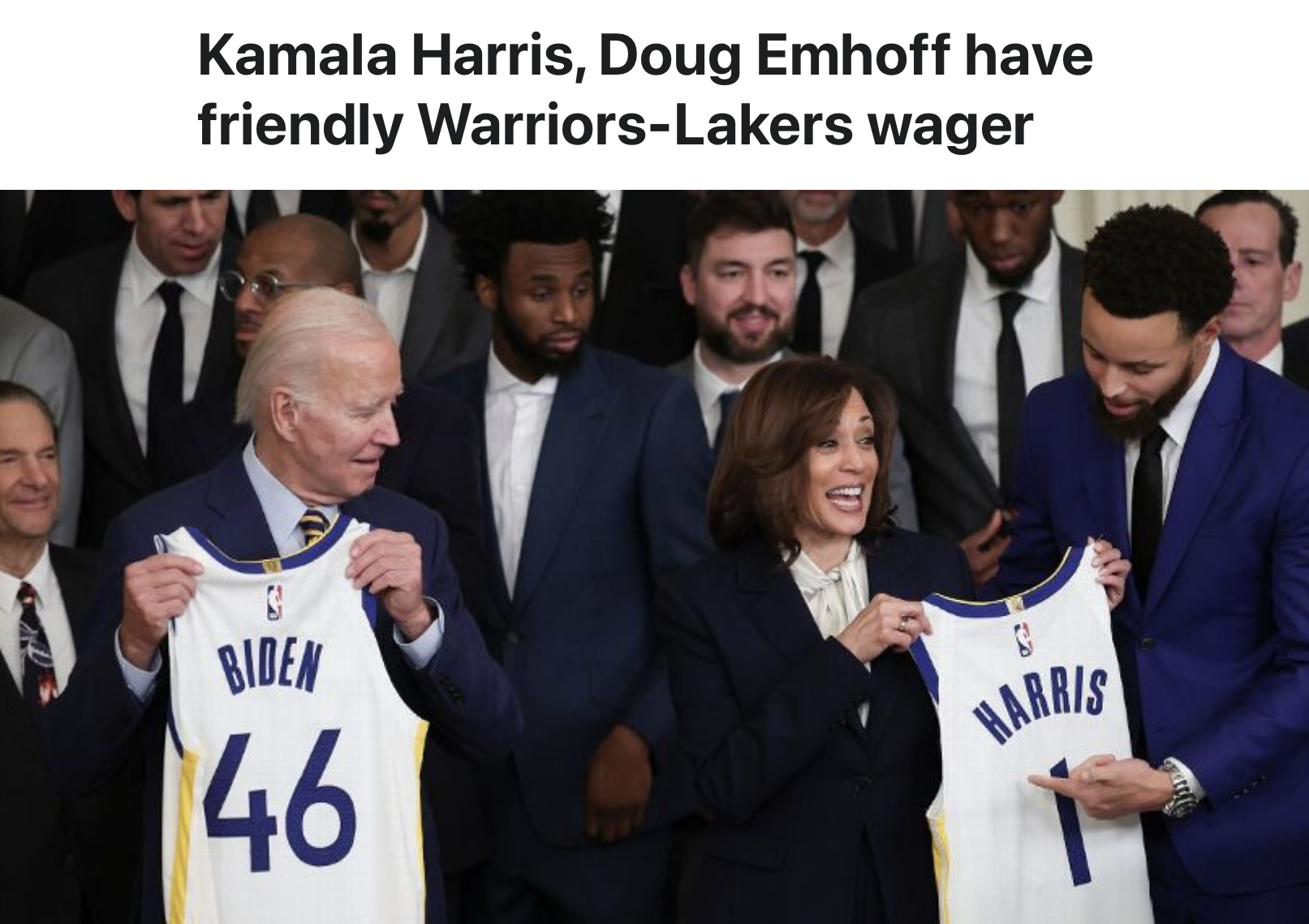
ESPN is a sports media outlet that was started in 1979 and has consistently grown in popularity ever since. According to YouGov, it’s the most well-known sports-exclusive channel in America.

Source: Pew Research Center
ESPN isn’t just a television channel, it’s also a website, and it operates across all major forms of social media to reach a wide audience. Of course, when you cover sports and nothing but sports, your audience can only be so wide, as it targets a specific group of folks worldwide. Pew Research Center found that younger Americans, women, and ower-income individuals are less likely than other demographics to follow sports closely. This leaves older people, inancially disadvantaged folks, and men as a major part of the prime audience.
ESPN’s general base should be considered when evaluating their content. We must ask ourselves, who might they be tailoring their content to? Does the inferred audience align with any potential bias from the network? Is there any notable bias? Soon, these questions will all be answered.
While ESPN rarely veers away from sports, this article will attempt to examine any portions of the network’s content that display an intersection between sports and politics. Examples of such content will be evaluated to determine the degree to which ESPN has a political bias– with help from Biasly’s A.I. technology.
How Does Biasly Rate News Sources?
Biasly’s algorithms produce bias ratings to help provide multiple perspectives on given articles. Biasly has analyzed 200,000+ news articles from more than 3,200 news sources through our A.I. technology and team of political analysts to find the most factual, unbiased news stories.
Biasly determines the degree of political bias in news sources by using Biasly’s Bias Meter Rating, in which Biasly’s team analyzes media sources’ reliability and bias and produces three scores, a Reliability Score that measures the accuracy of media sources; an A.I. Bias Score, evaluated by A.I.; and an Analyst Bias Score evaluated by political analysts. These scores are rated based on seven rating metrics including Tone, Tendency, Diction, Author Check, Selection/Omission, Expediency Bias, and Accuracy. These metrics help our analysts to determine the political attitude of the article.
Our A.I. machine-learning system employs natural language processing and entity-specific sentiment analysis to examine individual articles and determine their bias levels. By analyzing the key terms in an article such as policies, bias phrases, political terminologies, politicians, and their nicknames, the algorithms can rate the attitude of the text. Bias scores range from -100% and 100%, with higher negative scores being more liberal and higher positive scores being more conservative, and 0% being neutral.
Is ESPN Politically Biased?
Biasly’s Computer AI Bias Score for ESPN is Somewhat Liberal. This score is generated by AI-based algorithms. Biasly’s AI bias analysis focuses on the leaning of tone, opinion, and diction of the author, and their respective tendencies. For example, ESPN’s stances on abortion and gun control were classified as being Somewhat Liberal. It also found that liberal politicians such as President Joe Biden and Michigan Governor Gretchen Whitmer were covered in a negative light.
Recall the previous commentary on ESPN’s audience– it tends to be more concentrated within older male audiences. The network has faced criticism far and wide for being too left-leaning in their coverage of certain events or issues that take place “off the court.” Take a look at News Nation anchor Dan Abrams’ comments about ESPN’s potential bias, which were included in a 2023 article from The Wrap:
“Let’s be clear: ESPN certainly has shown a leftward leaning in recent years. Earlier this year the network honored transgender swimmer Lia Thomas during a celebration of women’s history month, they’ve been criticized by many over on the right about their coverage of Colin Kaepernick, their commentators frequently express left-leaning political opinions on air, on social media and elsewhere.”
These remarks suggest backlash from ESPN’s audience, which is interesting, especially when considering the demographic of their viewers. It can be inferred that older male demographics are more likely to be right-leaning than left-leaning, which could impact the perceptions of ESPN’s content. So, how much validity is there to ’s claims? How biased is ESPN? Is its audience correct in their assertions? We’ll explore further.
Before we begin, we need to discuss bias. Bias is a natural function of humans, and we can express it both consciously and unconsciously. Bias is one of the most fundamental forms of pattern recognition in humans. This isn’t to lower the bar and say that “all things are biased,” but to explain the process in which we may come to trust certain news organizations that display patterns of coverage.
On the media’s part, there is an incentive to retain audiences, encourage them to purchase subscriptions, and rate products positively. Bias is a two-way street, people want to see news stories about things they care about, and the media needs viewers to continue their operations. This creates a positive feedback loop that influences what stories are covered and from what perspective. This also explains the actions of more liberal news organizations.
Analysis of Bias in ESPN Online Articles
When determining bias, the metrics we use are as follows: Tone, Tendency, Author, Diction, and Expediency Bias. These are the primary metrics we’ll focus on below.
- Tone: The attitude displayed in the writing, related to the author’s word choices or diction.
- Diction: The words chosen by the author.
- Author: Relates to the article’s author, considering their history of stance on issues based on past articles and social media posts.
- Tendency: Measures how consistently an author shows bias in their work, including factors like their tone and perspective.
- Expediency Bias: Initial impressions created by concepts like the article’s headline, images, or summary, indicating if they favor a particular viewpoint.

When the author chose this language while describing a bet between Vice President Kamala Harris and her husband Doug Emhoff, they opened the gates to some questions about bias. Would someone like former President Trump be granted the same lighthearted diction choice if he had a bet of this nature with his wife? Some folks might feel as though this article has a slight liberal bias, based on the diction.
Considering this, let’s dive into another article, and examine all five bias metrics.
This piece might not seem biased from the headline alone, but when you take note of the diction used by the author, you may start to notice a trend.
“Despite being exiled from the NFL since the 2016 season, when he took a knee during the national anthem to protest police brutality and racial inequality, Kaepernick still wants to play.”
When the author notes that Kaepernick was “exiled” from the NFL and goes onto explain the rationale for the former-QBs protest, they are suggesting some level of sympathy for him and an inclination to support what he stands for (or in this case, kneels for). The diction is relatively positive towards Kaepernick throughout the article, with a consistent mix of sympathy and understanding that might rub some readers the wrong way and suggest an overall bias towards Kaepernick– and against those who “exiled” him.
Additionally, the author’s tone tells a similar story. Tone and diction often go hand-in-hand, and the language choices made throughout the article contribute to an overall positive tone towards Kaepernick. The use of the word “exiled” definitely suggests a pro-Kaepernick tone.
With all of this talk about the author, it seems necessary to expand on them, who they are, and what potential bias they could bring to the table. After all, author analysis is one of the key metrics when determining bias. Unfortunately, there is no author named for this article. Where an author’s name is usually included, the webpage simply says “ESPN News Services,” meaning no specific person is tied to this piece. If there were a name, however, it would be appropriate to do some research on this individual and look for any potential political bias in their background, or things they’ve said away from ESPN.
The tendency metric focuses on how often the author shows such a bias, but since we don’t have an author’s name, we can’t determine this. It’s worth noting, however, that searching for tendency can be key alongside a background check of the author to measure the extent to which they are– or aren’t– politically biased.
Finally, there is expediency bias, which looks into the degree to which headlines or images are meant to sway readers a certain way. There are no images in this article, although there is a video attached that features commentators discussing Kaepernick. The headline itself, “Colin Kaepernick, Disney announce partnership deal,” is pretty generic and doesn’t seem to suggest any pro-Kaepernick bias.

Overall, while this article isn’t necessarily bursting with bias, there is still a left-leaning tendency that’s detected by an analysis of metrics. This is consistent with Biasly’s classification of ESPN as a whole.
Analysis of ESPN Opinion Articles
ESPN does not feature any opinion articles that are related to politics. They do, however, have some pieces dedicated to sports opinions, such as predictions, analyses, and more. Due to the lack of political opinion pieces, there is nothing to analyze for this section. Additional opinion and political discussion can be found on the ESPN TV channel, radio, and video content. Our rating and analyses within this article only touch on the website and written forms of media, which may include some video transcription and text analysis.
Who Owns ESPN?
ESPN was originally founded by three men in 1979: Bill Rasmussen, Scott Rasmussen and Ed Eagan. It has since been sold to ABC, who is owned by Disney. Both Bill and his brother Scott started their professional careers in sports announcing and sports radio, but of course, eventually worked their way up to owning a sports media company of their own: ESPN.
After co-founding ESPN and then selling it to ABC in 1984, Scott Rassmussen went on to create Rasmussen Reports, a conservative-leaning olling company. The switch for ESPN is quite interesting when considering the fact that it went from being owned by a pair of brothers that later revealed some level of right-leaning ideology, to ABC, which is considered by Biasly to be a Somewhat Liberal network.
This switch suggests that ESPN’s left-leaning bias wasn’t inherent through its creation, but rather, became more prevalent with the ABC/Disney purchase. Nowadays, ESPN is also co-owned by Hearst Communications, an American multinational mass media and business information conglomerate based in New York City. Its founder, William Randolph Hearst, was considered to be on the left wing of the progressive politics, speaking on behalf of the working class and denouncing the ultrawealthy.
How to Evaluate and Uncover Bias
It can often be difficult to tell if the news you watch is biased. If you have settled on a news channel, it’s usually because you trust the information you are gaining. Unfortunately, many trust the information they are hearing because it confirms what they already believe. This is referred to as “confirmation bias.” It is important to challenge your beliefs and get third-party verification that what you are hearing is the full story. This is why we recommend using Biasly to compare different news stories side-by-side using our bias ratings to figure out what both sides think of a political issue.
It has been determined that while ESPN does feature some left-leaning bias, they are generally trustworthy, and rarely expose this bias. Most of the time, the outlet writes about sports, not politics. Of course, an intersection between the two sometimes arises, and when it does, readers should process with caution, considering the findings of this work.






















